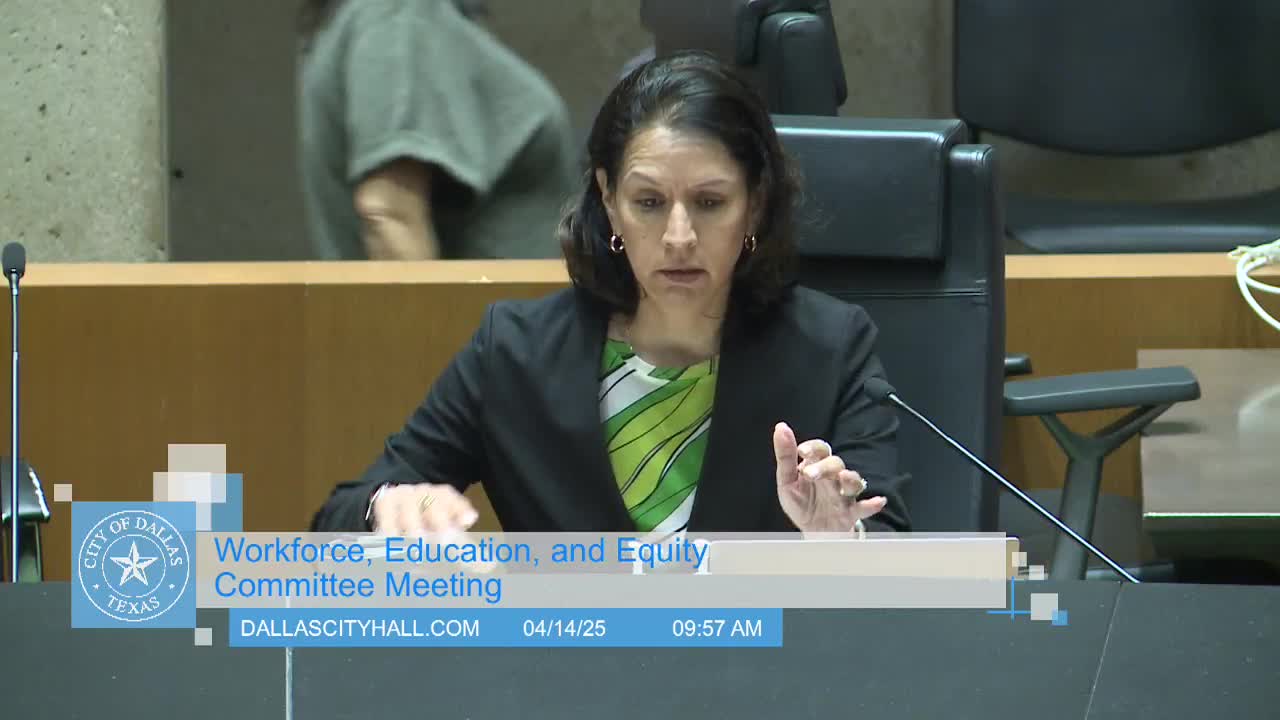Dallas County health officials flag worsening food insecurity, outline gardens, mobile market and SNAP outreach
Get AI-powered insights, summaries, and transcripts
Subscribe
Summary
Dallas County Health and Human Services told the committee that food insecurity in Dallas County exceeds state and national averages and described a multi-pronged response including community gardens, urban orchards, a mobile market, farmers market expansions and SNAP outreach.
Dallas County Health and Human Services officials briefed the Workforce, Education and Equity Committee on April 14 about the current status of food insecurity in Dallas County and county-led programs intended to expand access to healthy food, particularly for children and in neighborhoods with the highest need.
Dr. Philip Wong of Dallas County Health and Human Services told the committee that both overall and child food-insecurity rates in Dallas County exceed U.S. averages and that Black and Hispanic residents experience higher food-insecurity rates than white non-Hispanic residents. He described food insecurity as a social determinant of health that is associated with chronic conditions such as diabetes, heart disease and obesity.
Wong outlined a three-part strategic approach the county is using: increase access to nutritious food in high-risk ZIP codes, bolster local production through urban agriculture and orchards, and provide education and workforce training connected to food production and nutrition. He said county-led or county-supported programs include community gardens, an urban mini-orchard initiative, a farm-to-school program, infrastructure grants for urban agriculture and a mobile market called Wellness on Wheels.
Key program details presented to the committee included:
- Community garden grants: The county reported more than $150,000 distributed across four rounds to support community gardens and said production at supported gardens rose 30% to 100% after assistance. The county has supported more than 38 gardens and provided Master Gardener volunteer connections to over 34 gardens.
- Urban mini orchards: The county and nonprofit partners established mini orchards at 18 sites and planted roughly 139 fruit trees and more than 34 blackberry brambles.
- Urban agriculture infrastructure grants: A county pilot funded $99,600 in the first round to support infrastructure improvements for 14 growers and urban agriculture operators; county and city staff said additional rounds may follow.
- Farmers market and mobile market: Using a USDA grant, the county established an Oak Cliff Farmers Market (907 E. Ledbetter Road) that held 31 market days in 2024, serving 4,780 customers with 22 vendors. Parkland provided more than 1,100 free health screenings at the market. The Wellness on Wheels mobile market, launched October 2024, has sourced produce from at least five local growers and has supplied more than 500 pounds of produce to 93 Dallas County residents through the mobile market.
- SNAP enrollment and nutrition education: County staff said their SNAP eligibility checkups and enrollment work enrolls about 400 eligible residents annually through county efforts; they said SNAP-education programs have delivered 474 nutrition classes since 2021 with roughly 9,400 participants. The county is also planning to implement a Double Up Food Bucks program to pair SNAP benefits with incentives at local markets.
Dr. Wong and his team emphasized that production alone will not solve food insecurity and that distribution, affordability and income are essential parts of a regional plan. Councilmembers and committee members raised questions about how "food desert" areas are defined (city staff said USDA definitions generally use one-mile access in urban areas and up to 10 miles in rural areas), how community gardens are staffed and sustained, and how the county's programs interface with the city's adopted Urban Agriculture Plan and the city's Climate, Clean Air & Sustainability Plan (CCAP).
Jessica Galashaw, director of the Office of Community Care and Empowerment, said the city is partnering with the county on park and recreation sites to host the mobile market and that the city and county are coordinating training and technical support for growers. Council members urged more public-facing resources to show residents how to help: one member suggested a short, shareable "three actions" graphic (advocate, donate, volunteer) with links to local food banks, donation pages and volunteer opportunities; staff said they would work with county communications to produce and distribute materials for council newsletters and social media.
Several council members emphasized urgency and asked staff to prioritize programs that feed children during school breaks. County staff noted the importance of preserving federal and state funding streams that support SNAP, WIC and other nutrition programs and urged public advocacy if funding is threatened.
The committee did not take formal action on the county presentation. Staff said they will provide follow-up materials and work with council offices and county partners on an outreach graphic and referral information for residents seeking to donate or volunteer.
